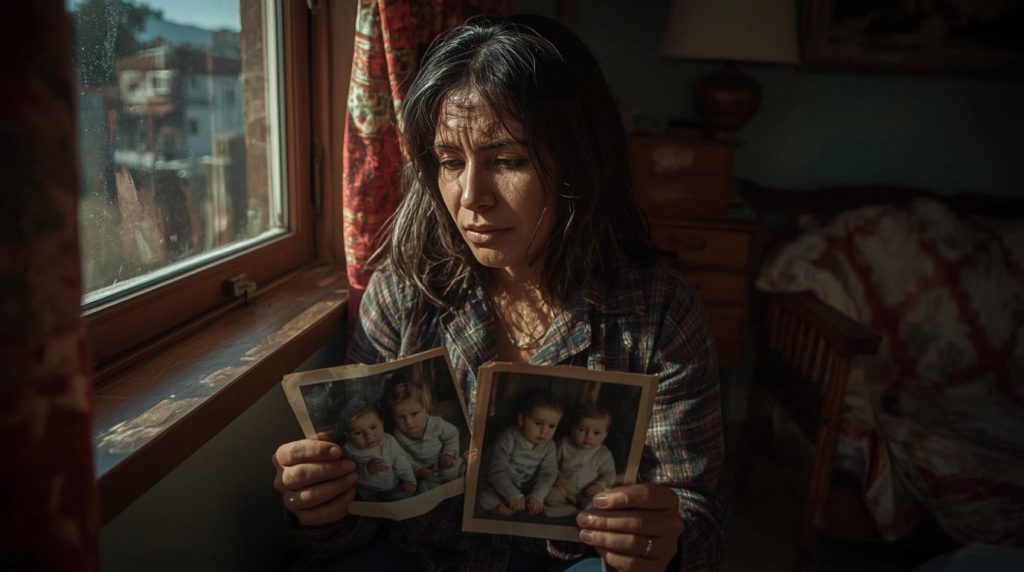Emotional Reunion After Decades of Separation
A powerful story of a mother’s unbreakable spirit has captured hearts around the world. A Chilean mother, María Verónica Soto, 64, finally held her twin daughters, María Beatrice and Adelia Rose Mereu Chessa, after 45 years apart. They were taken from her as tiny babies in 1979, set against the dark backdrop of General Augusto Pinochet’s dictatorship. The reunion happened in Concepción, Chile, the place where the twins first landed after flying in from Italy, the country that became their home when a couple there adopted them against their mother’s will.
This reunion shines a spotlight on the thousands of cases that wound through the country’s painful history. During that brutal military period, authorities snatched babies from their vulnerable mothers, selling them illegally to families, many of whom lived abroad. Through the years, María Verónica pressed on, refusing to give up hope. She tracked court records, followed the stories of survivors, and prayed every night that she would hear the names of her lost daughters.
The Dark History of Chile’s “Children of Silence”
Between 1973 and 1990, when Chile was under Pinochet’s brutal dictatorship, thousands of infants were ripped away from their biological mothers and sold for adoption to mainly American and European couples. In the Chilean memory, these children were branded “the Children of Silence.” The organized crime chiefly targeted poor, marginalized women, who were deceived into surrendering their newborns to fake adoption agencies.
Some newborns were handed over in secrecy by grandparents eager to erase the social stigma of an “unmarried” pregnancy. Doctors, priests, and nuns formed a shadowy circle that backed the grandparents and stripped young mothers of their tonal lives.
The long-buried pain resurfaced when a Chilean mother met the adult children she lost more than 40 years earlier. The reunion was made possible by Chilean courts that have only recently begun to investigate the crimes. In a watershed decision, Judge Alejandro Aguilar Brevis revealed that, of the hundreds of cases documented in 2025, a network comprising clinics, Catholic schools, and even a magistrate collaborated to register the infants of poor Chilean mothers under false names and then falsely listed them for adoption to couples from Europe and the United States.
Transaction records showed the illegal “adoptions” generated payments to the syndicate that reached $50,000 per case. Now the long night of injustice bears witness in the courts, and hope flickers into the silence that emptied so many Chilean homes.
A Mother’s Decades-Long Search
This determined Chilean mother’s ordeal dates back to 1979, when she delivered twin girls in the coastal town of Hualpén, Biobío. Eight months later, a routine clinic visit for the girls turned nightmare.Clinic staff separated the babies, assuring her they needed a harmless evaluation with promised medical and food support. Instead, the authorities accused her of neglect and seized her daughters .

When the devastated Chilean mother turned to the police, they redirected her to the courthouse. Only there did she learn the truth: her babies had been secretly handed to an Italian couple whom the state had decided should adopt them. Later, she found the altered birth certificates, which falsely declared that no parent had ever arrived to claim the girls—a cruel practice common in such abductions .
For forty-four agonizing years, this brave Chilean mother hunted for her children, steady in her conviction that she would one day reunite with them. “Today they listen to women. Back then, they didn’t listen to women. Chilean mothers had no voice in those years. We women couldn’t stand up for ourselves like we do now,” Soto recalled.
The Heartbreaking Truth of Baby Theft in Chile
The heartbreaking reunion of a Chilean mother shining a light on a wide-scale crime involving infants shows how deep the pattern of baby theft really goes. Over the past decade, volunteer organizations in Chile have kept proof of this crime. Since 2014, CNN has shared story after story of people snatched as infants who, thanks to DNA testing, have embraced the mothers who never wanted to let them go.
Constanza del Río leads a group called Nos Buscamos, or “We Are Looking for Each Other.” She explains their records of nearly 9,000 missing toddlers, babies, and older children, and celebrates the more than 600 families who have finally taken home their missing loved ones. The Chilean mother who just welcomed her sold child home relied on the same team to find the truth.
Exactly a decade before the latest reunion, Marcela Labraña, who ran the child protection service SENAME, confirmed to CNN that her team was chasing leads on hundreds of missing infants. “We even suspect it could reach many, many more than this,” she warned in 2013. “But this is no story. This happened and the truth now is clear.”
The Path to Reunion
The long road to reunion for this Chilean mother actually started back in 2020 when Soto reached out to Nos Buscamos. Del Río, who’d also been illegally adopted as a child, right away said she needed a DNA test. So Soto mailed her sample to a U.S. bank linked to My Heritage, the genealogy site that teams up with Nos Buscamos to match lost family.
Every year that followed, the restless Chilean mother kept texting for updates, never once losing her faith. “I kept telling her, ‘We have to wait for the other side of the bridge,’” she explained, “which means her daughters or grandchildren would also need to test.”
Then, the moment the whole community had prayed for finally came—March of this year. Soto’s grandson took the test, matched Grandma, and rushed to Facebook. “Within 20 minutes, they were already talking,” Del Río remembered. Emotional Reunion at Concepción Airport
On September 10, 2025, the twins flew from Italy to Concepción, Chile, with anxious smiles lighting up their faces as the airplane taxied to the gate. Normally sleepy, Concepción Airport transformed into a lively celebration. Pilar Soto, the only Chilean mother they’ve ever imagined, waited there surrounded by a sea of cousins, aunts, news reporters, and local officials. After a 45-year journey, their family had finally come together.
Maria Beatrice and Helena Mereu Chessa sprinted from the jet bridge. In a cloud of questions and laughter, they fell into Soto’s open arms. “Mamá siempre te buscó,” Soto cried, her voice shaky and tender, though the girls didn’t yet speak Spanish and she didn’t know Italian. Somehow the tears, the smiles, the hugs, and the lively shouts of “hermanas!” translated every word every heart ever wanted their mother to hear.
“We have, like, so many emotions,” Maria Beatrice gasped a few seconds later to the cameras, her voice full of joy. “So, so happy because we finally found our mother! We want to be with her, with the family— todos los hermanos, todos los tíos, todos los primos, ¡todo el mundo!” Her sister nodded, failing to hide their shared grin, as the crowd erupted in laughter and tears of their own.
The Impact on Families and How Chile Is Making Things Right
The brave Chilean mother with her two twin daughters knows that everyone in this story has been misled—her own family in Chile and their Italian adoptive parents, who never realized they were taking in children who had been taken without their mother’s agreement. Many reunion stories are like this, revealing that adoptive parents believed they were rescuing kids in real need.
To right these past wrongs, President Gabriel Boric has stepped in. In June 2025 he shared that the investigative task force formed in 2024 had delivered its final findings on the stolen-babies cases. Boric promised that, based on the report, the Chilean state would build a “genetic fingerprint bank.” This bank aims to make the search for real roots faster and safer, so hundreds of kids who were taken for years and placed in foreign homes can finally reconnect with their true families.
This planned tool will assist many more households like this Chilean mother’s, who dream of finding the children kidnapped from them. The country’s open recognition of these hurts marks a real step forward for everyone who has suffered.
Never Losing Hope
A courageous Chilean mother shared a powerful message for other moms still searching: “I fought until I found my girls. That’s why I tell those mothers not to stop fighting. Knock on doors, because now there are more possibilities thanks to technology.” She spent almost fifty years apart from her twins, yet still feels blessed. She knows too well that many mothers still haven’t found their lost children, and some have passed on waiting for a reunion that never came. “God heard me,” she said after their tearful meeting. “For me, this feels like giving birth to my daughters again—only this time they’re adults.”
The Continuing Search for Justice
Although this reunion brings peace, the fight for justice goes on. Judge Aguilar has charged five people and ordered arrest warrants, saying they must stay in custody for “criminal association, child abduction, and willful misconduct.”
The judge decided that the time limit usually set for prosecuting crimes doesn’t apply here, calling the theft of children “atrocities against humanity carried out by a military state.” He said the law protecting human rights throughout the Americas, as argued by the Inter-American Court, required these cases to go ahead, no matter how old.
This ruling clears the way for more trials, marking a bold advance toward justice for the human rights abuses that tore apart so many families, including the Chilean mother who almost never stops pushing for the truth.
Conclusion: a story of hope and resilience
The life of this courageous Chilean mother symbolises the deep damage done by state-sanctioned theft of babies, and also the fierce light that unyielding hope can give the darkest days. Her 45-year quest to find her daughters proves that the pull between a mother and her children never fades, even when almost half a lifetime, miles of ocean, and borders stand between them.
While Chile still reckons with this ugly era, her saga gives comfort to others who still search. Advances in DNA test costs and growing state and civic backing bring fresh promise that reunions no one dared dream as possible may soon take place.

When this Chilean mother saw her twins again after years apart, the moment proved how strong the heart can be and how family ties stay strong, even after long separations.
Source: https://edition.cnn.com/2025/09/16/americas/chile-stolen-twins-mother-reunion-intl-latam
For more incredible stories of everyday news, return to our homepage.





